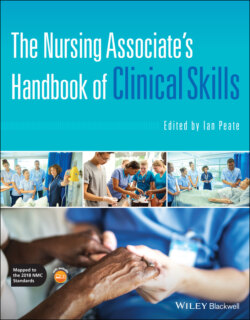Читать книгу The Nursing Associate's Handbook of Clinical Skills - Группа авторов - Страница 130
Touch Point
ОглавлениеWhat do you think is the biggest barrier to effective communication in healthcare?
Listening actively with a person who speaks a different language requires some consideration. The non‐verbal actions – body language and time – remain the same, but due to the use of an interpreter, the conversation will not flow in the same way. When using an interpreter, it is essential to maintain eye contact with the service user and not with the interpreter. The use of silence is more challenging when using an interpreter, but it is important to remember the technique of active listening and try to use it. Using an interpreter also has implications on both confidentiality and privacy (Nursing & Midwifery Council 2018a). Sully & Dallas (2010) explore the implications of using a family member as an interpreter and the way in which that can affect communication. Using a family member provides a conflict of interest as they are not trained in translating medical terminology; they are also emotionally involved so may not translate exactly what they should; furthermore, the patient may not answer certain questions truthfully or openly in front of certain family members. By using a family member as an interpreter, the patient is not being allowed the time and space to be honest and open with the healthcare professional.
It is also important to consider who is in the room (or the area where the interaction is taking place) during the interaction; some patients may be comfortable discussing their concerns and fears in front of other people; however, others need more privacy. It is important to establish who, if anybody, the patient is happy to have in the room during the interaction. If a wrong person is in the room, then it may hinder the communication episode entirely, and this needs to be understood and respected.
Strong accents can be difficult to understand, and this therefore can hinder communication (Sully & Dallas 2010). The accent may be from the patient or from the healthcare professional. If a patient is struggling to understand what it is that the healthcare professional is saying, they may not feel confident enough to be open and honest with them. A therapeutic relationship cannot be assumed or forced. The patients will develop this relationship and will communicate with the healthcare professional whom they feel they are able to do this with.
Open and honest communication requires privacy. An inpatient hospital environment is not always the most private place. Curtains are not soundproof, and for someone to feel comfortable enough to be open and honest, privacy is a requirement. Unfortunately, there is not a lot that can be done about this, but being aware can help. Occasionally, depending on the environment, it is possible to go to a quiet room, but that is not always the case; speaking quietly and discreetly is sometimes the best that can be done. It is important to acknowledge this limitation with the patient should it occur, and it is also essential to maintain confidentiality (Nursing & Midwifery Council 2018a).
